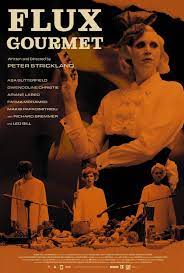
FLUX GOURMET
UK, 2022, 111 minutes, Colour.
Fatma Mohamed, Asa Butterfield, Ariane Labed, Gwendoline Christie, Makis Papademetriou, Richard Bremmer, Leo Bill.
Directed by Peter Strickland.
This will depend on your predilection for the esoteric. And, the esoteric can sometimes be both exotic and bizarre evoking curiosity and repugnance.
British director, Peter Strickland, has made quite a number of esoteric films (and the leading actress here, Romanian Fatma Mohamed has appeared in all his key films). Peter Strickland’s films are definitely for a specialist audience, films which would find their place in an art gallery or an Institute for installations. While Flux Gourmet was filmed in Yorkshire, there is a continental flavour in its casting and use of different languages.
Some historic background, 1996, Peter Strickland establishing the Sonic Catering Band:
The notion of the Band was/is to employ a similar approach to electronic music as to (vegetarian) food; taking the raw sounds recorded from the cooking and preparing of a meal and treating them through processing, cutting, mixing and layering. No source sounds other than those coming from the cooking of the dish are used and as a commitment to artistic integrity, every dish is consumed by all members of the Band. The Sonic Catering Band was specifically conceived as a project and not a band as such.
We are introduced to a specialist institution for Sonic Caterers, presided over by an imperious director, Jan Stephens, played by Gwendoline Christie. She accepts limited clients, in this case only three, Elle di Elle (Fatma Mohamed), Lamina (Ariane Labed) and, prosaically, Billy (Asa Butterfield). We are treated to their performance art, mime, music, sound engineering. Definitely esoteric. They live in a kind of dormitory, are bound to a strict regime, but there are quite emotional tensions amongst them.
And for fashion enthusiasts, the range of costumes, style, shapes and colours worn by Gwendoline Christie are distractingly exotic.
In some ways, the story is narrated by a journalist who has been hired to interview and publicise the Institute and its performers, Stones (Makis Papademetriou) who is suffering from all kinds of gastric ailments and flatulence, interviewed by the resident doctor, the Greek mythology-quoting and supercilious Dr Glock (Richard Bremmer). We are invited to share Stones’ stomach-turning misery (although there is a final plea for gluten-free food).
A commentator raised a significant issue: is this a lavish and colourful satire on pretentious art and performance? Or is it in itself pretentious art and performance? Probably the answer is not either-or but rather both-and. It certainly does mock characters, situations, aspirations to artistic grandeur. But, by using pretentiousness of style, Strickland is able to capitalise on satire as well as have his cinema art ambitions.
- The title, food, cooking, appreciation, bodily functioning?
- The background of the Sonic Catering Band, and Peter Strickland’s history, aims, incorporating the experience into this film?
- An esoteric film, the touch of the exotic, the bizarre, the weird? For specialist audiences? The cinema equivalent of an installation?
- Costumes and decor, the exotic costumes for Jan Stephens, her make up and eye style? The members of the band, ordinary clothes, costumes for performance? For Stones, Dr Glock, the guests at the Institute?
- The institute, interiors, performance space, meal space, the dormitory for the participants? The countryside outside?
- Music and sound, electronic, cooking, sound engineering?
- The Institute, presided over by Jan Stephens, her personality, demands, her choices, exclusion of other groups (and the visuals of their sabotage and attacks)? Her relationship with Billy?
- Stones, his presence, narration, journalist, the range of interviews and revealing the characters, their responses to him? His physical condition, flatulence, the interviews with Dr Glock, the doctor’s treatment of him, his reactions, concealing his flatulence, getting up during the night…? The treatment, the issue gluten-free? Health?
- The trio, as a group, Elle as leader, demanding, decisions, criticisms? Her personality, background, performance? Lamina, her relationship with Elle, emotional, sexual? Falling out? Her ambitions, place in performance? Comparisons with Billy, more ordinary, his background, family, music, cooking, participating? The revelations from the interviews with Stones?
- The meals, Jan Stephens presiding, the after-dinner speeches, the reactions of each of the speech-makers?
- The guests, watching the performance?
- The cinema audience, response to the music and sounds, to the performances?
- The satire on pretentious art? Peter Strickland using pretentious art for his satire as well as his communication?